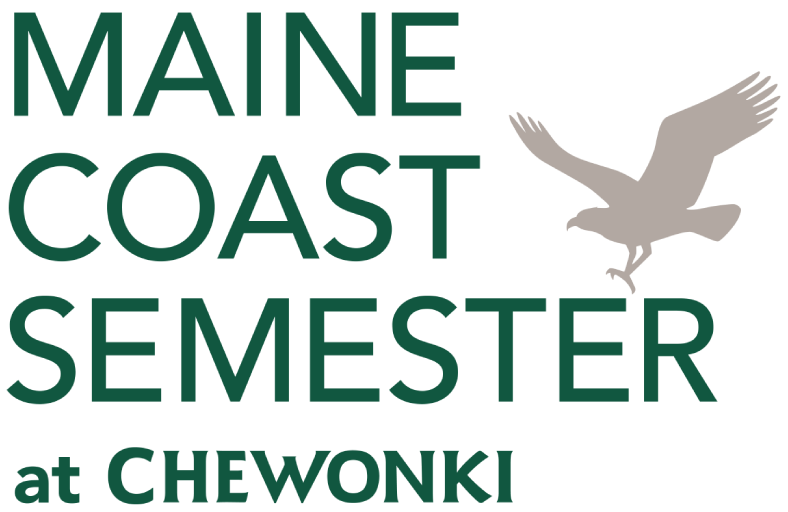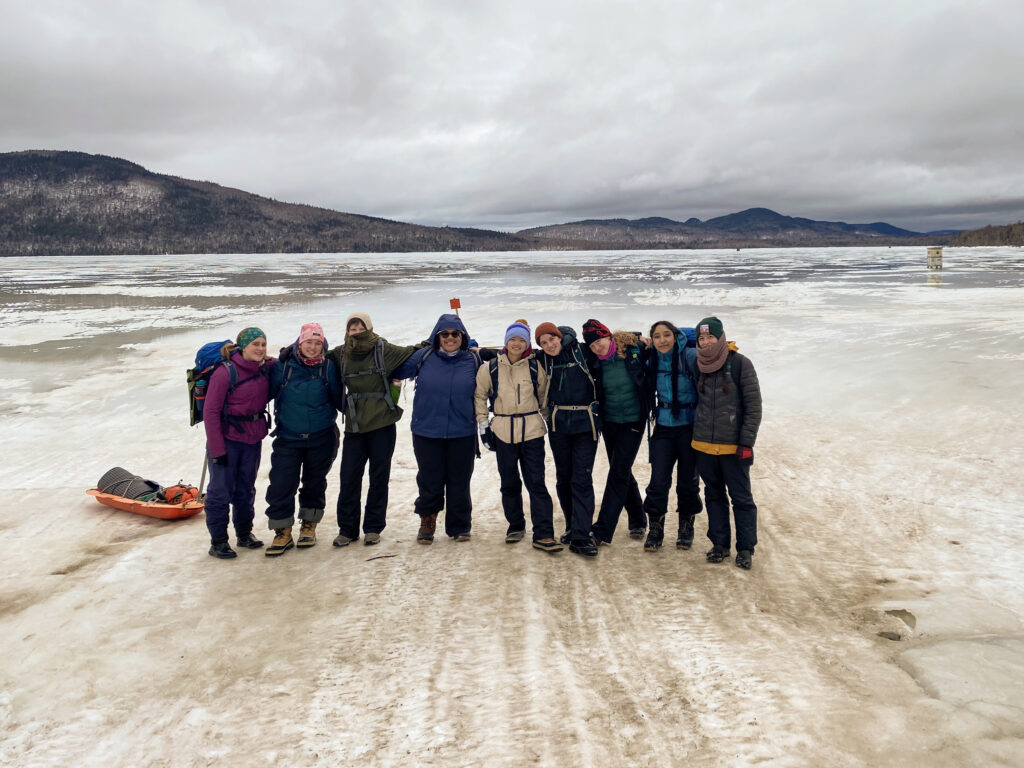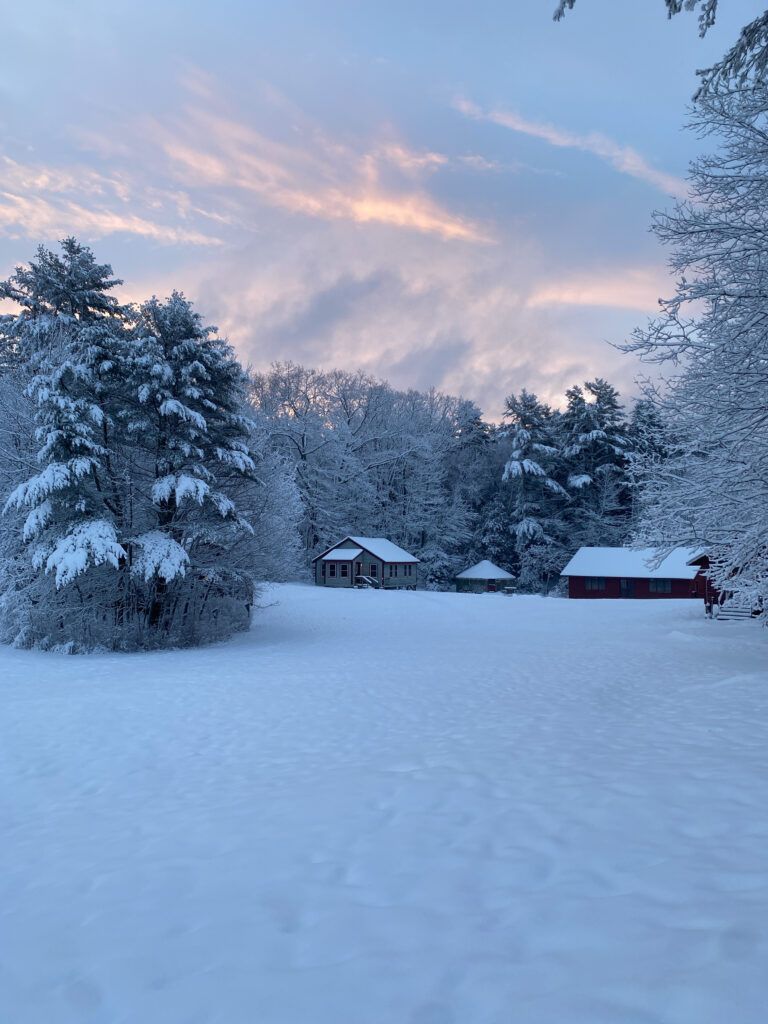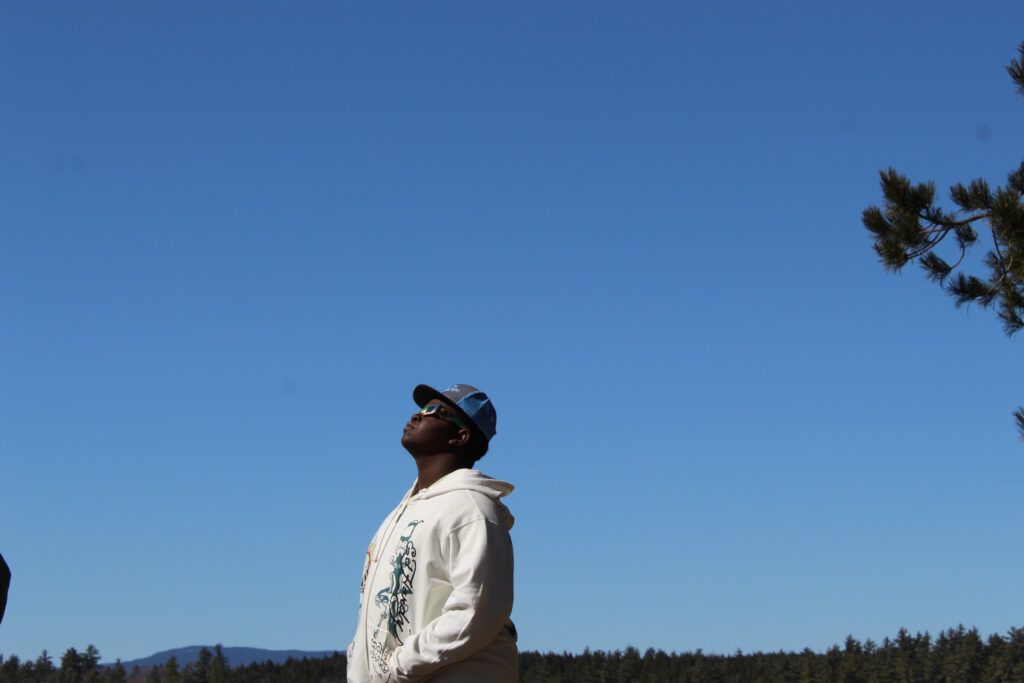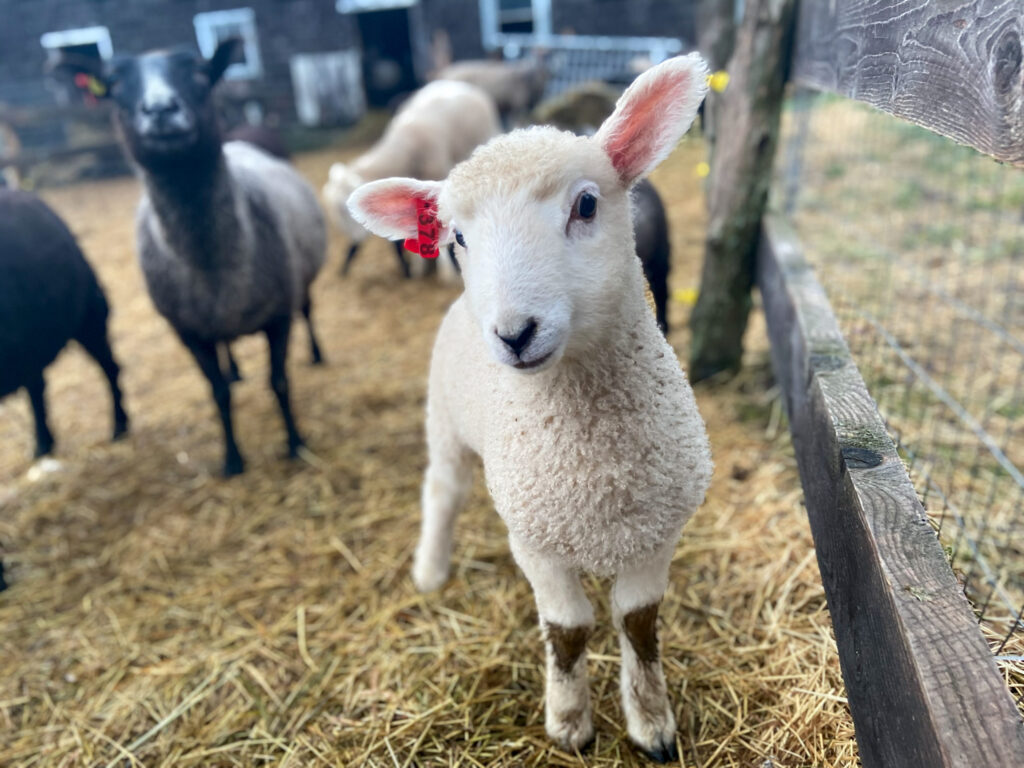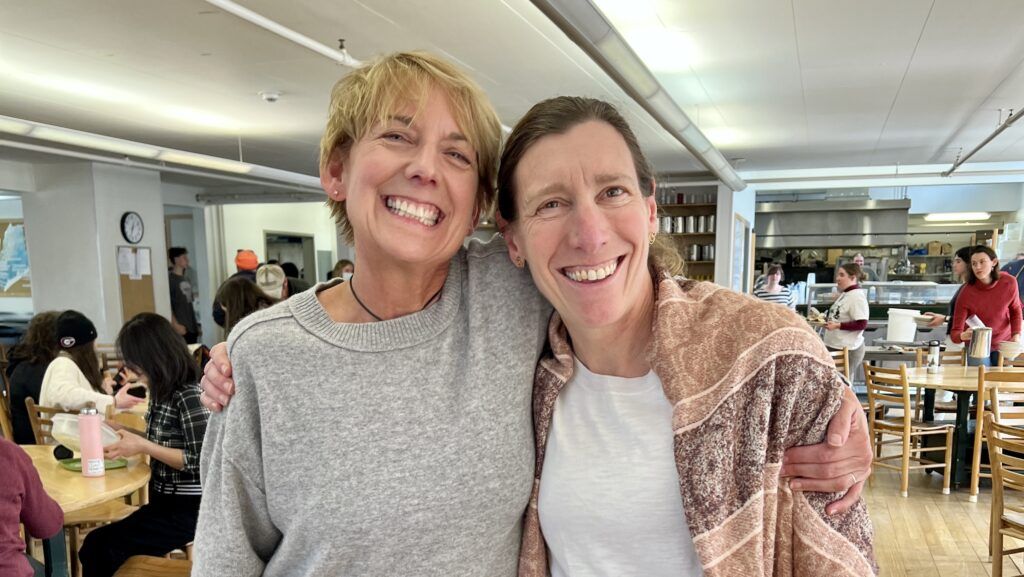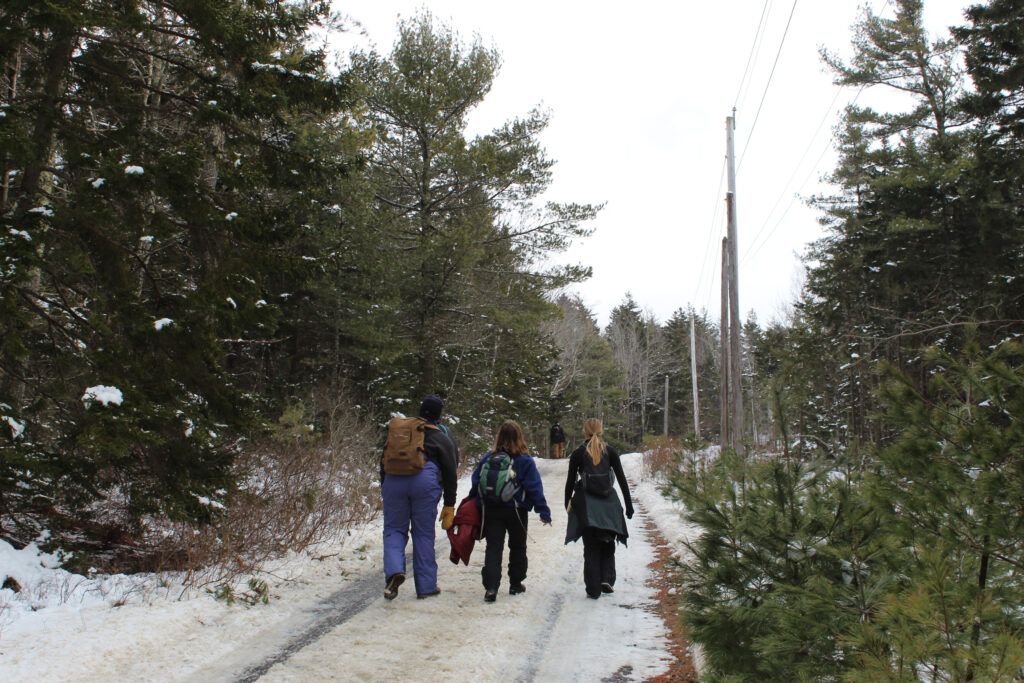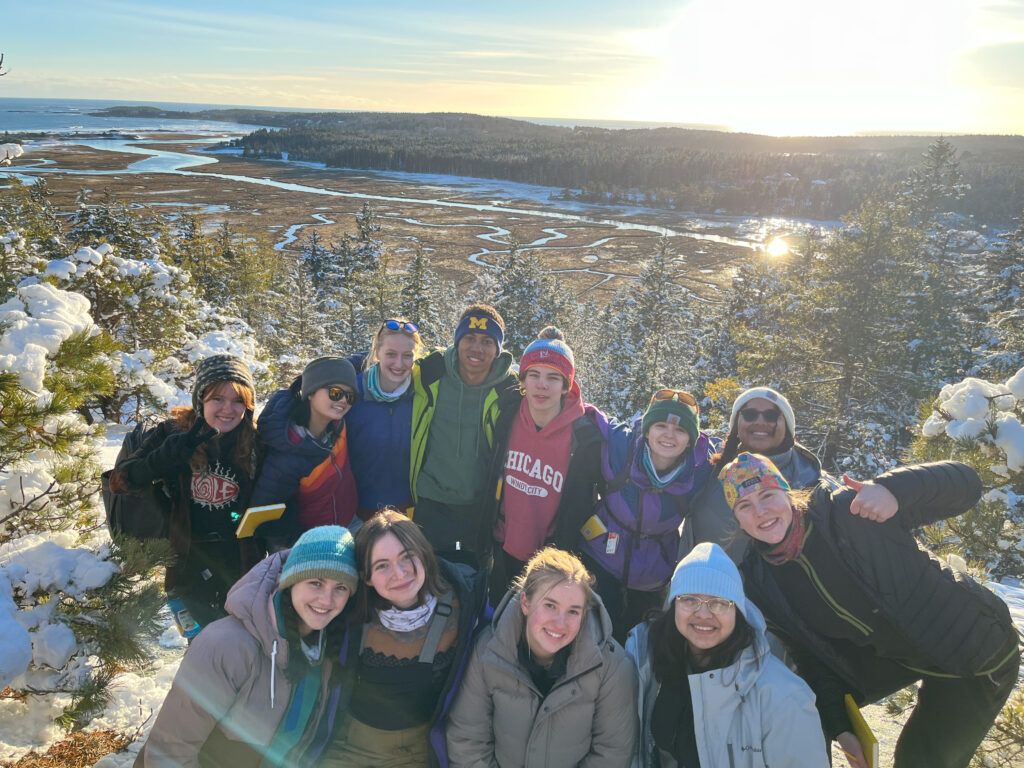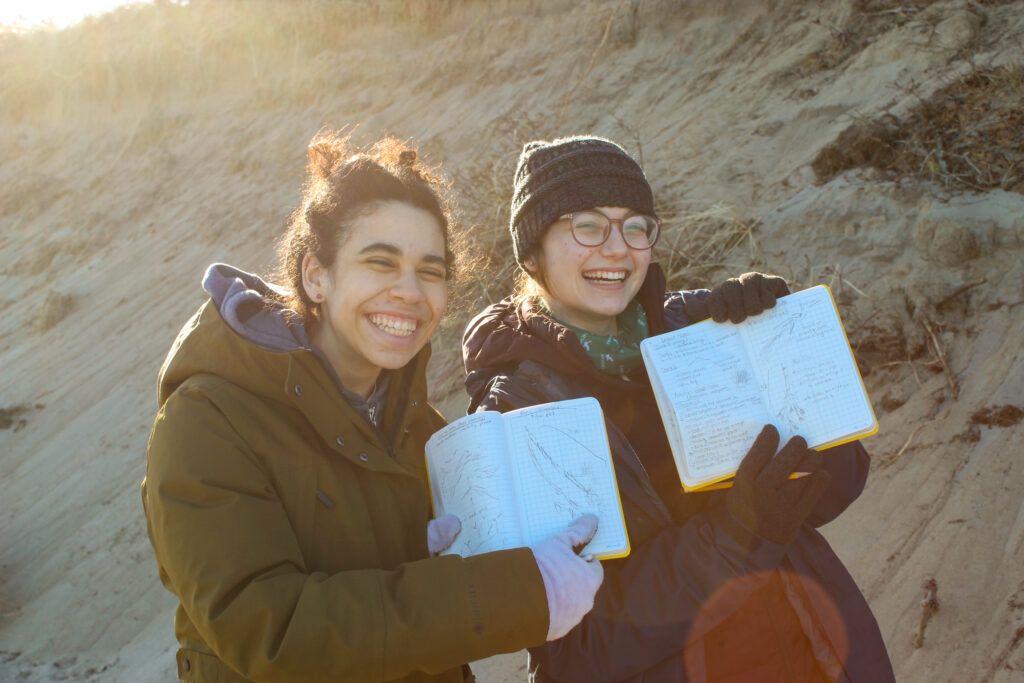We are sad to announce that Sal, our beloved American Belgian chestnut mare, passed away last Friday, on a brilliant blue-and-gold October day. At the time of her death, she was attended by her long-time veterinarian and the farmers who worked with her – and loved her – every day. Sal was 22 years old.
“Sal was often the first thing people saw when they drove into Chewonki, and the last thing they saw as they headed off the peninsula,” says Farm Manager Megan Phillips.
Over the course of Sal’s 17-year tenure at Chewonki, we estimate she engaged and educated tens of thousands of eager young minds, through programs like Maine Coast Semester, Camp Chewonki, the Outdoor Classroom, and her much-anticipated public appearances at the Common Ground Fair. It may be fair to say that Sal was “one of the most famous horses in Maine.”
Sal was the backbone of our farm and food system at Chewonki, playing her pivotal role as an educator and the literal horsepower for countless projects:
- Pulling the plow, the manure spreader, the cultivator, the sickle-bar mower, the tedder, the baler, and the hay wagon
- Twitching trees in the deep snow
- Giving wagon rides, hay rides, and sleigh rides
- Helping students, campers, counselors, and young farmers learn to drive a horse cart
- Patiently acting as the prime subject for many Maine Coast Semester students’ research projects
- Celebrity appearances at the Common Ground Fair for instructive presentations such as “Becoming a Horse’s Human”
- Unofficial spokes-horse for guests, visitors, and participants at Chewonki, and a champion of sustainable farming
“Our work at Salt Marsh Farm has been centered around horsepower, and, therefore, around Sal,” says Phillips. “On the farm, relationships are built through working alongside each other… My favorite of these relationships involves Sal.”
Phillips is quick to recall the patience of this remarkable horse “in the barn after working all day, and being sponged down by one child while ten others brushed her with various grooming implements,” she laughs. “There was always a child who would scratch the itchiest spot on her belly. At this, her stillness would break, she would crane her neck forward, curl her lip Elvis-style, and twitch her head from side-to-side (the Sal version of, ‘Oooooooh. Right there. You found it. Please keep scratching.’) Children were always her comfort zone…she felt safe.”
“She worked with us, not for us,” says Phillips. “I saw one semester student learn this lesson early on when he struggled to make clean turns with Sal while driving her from a cart. When he finally accomplished a tight turn, he gleefully yelled out, ‘I control you!’ …Sal promptly came to a dead stop and refused to move until the student let out a quick stream of, ‘I didn’t mean it, hon. I know you’re in charge. Please just go.’ After that, the student went on a campaign to work with, groom, and lead Sal whenever possible, intent on rebuilding their relationship.”
 Sal first arrived at Chewonki in 2004, originating from a farm in Meddybemps, Maine. She was introduced to Chewonki by Mark Albee (farm manager from 1991-2005), who continued to be her farrier through the years.
Sal first arrived at Chewonki in 2004, originating from a farm in Meddybemps, Maine. She was introduced to Chewonki by Mark Albee (farm manager from 1991-2005), who continued to be her farrier through the years.
In the 2004 Chronicle, Albee wrote: “People likely view the use of a horse to work this farm as quaint. In many ways, though, this horse stuff is the epitome of progress. Sal is perfectly solar-powered. I can recycle her waste products right here, returning them to the land that grows our vegetables and her pasture and hay. She is low-impact but has all the power and energy we need on this small farm and woodlot. She is living, relational, and fully decomposable. She becomes a better horse to the degree that we become better humans.”
When Albee heard that Sal was at the end of her life, he told Phillips, “To be able to work, and to be useful right up to the end–that’s a good life.”
Phillips says “Every farm crew member held deep and abiding working relationships with Sal. On paper, she belonged to Chewonki, but she was never ‘our’ horse. We were deeply blessed to be her humans.”
This past summer, we were fortunate to welcome Bob, the handsome new Suffolk Punch draft horse who joined the farm, as he will continue the job and pick up the plow. Bob is a great example of the network of Chewonki friends & alumni that make this work possible- Bob comes to us from Brad Johnson, another former farm manager who now works as a professional horse logger in Vermont.
We have countless bright memories of Sal to cherish, and yet… will miss her. And so will everyone lucky enough to have known this sage, sassy, copper-colored queen of Chewonki Neck.
A Selection of Favorite Memories
What follows is a selection of our favorite memories about Sal, pulled from articles, journals, personal notes and emails over the years:
“Sal was not a push-button horse. Not just anyone could pick up the lines and work with her. She could be flighty and fierce when she was in a mood or didn’t feel secure. There were things we could not teach with Sal, like giving full autonomy on the lines to new teamsters. And – not in spite of her but precisely because of her – there were things that we could teach with Sal about relationships, listening, humility, and valuing imperfections that we would not be able to teach as easily with a more easygoing horse. She did meaningful work on this farm for 17 years. I want folks to know how much that work – how much she – mattered. We raised thousands of pounds of vegetables on land that she plowed. She went on countless haycart rides down Chewonki Neck Road with ice cream being churned by campers in the cart behind her. She pulled thousands of logs out of the woods for firewood. She participated in one of my favorite annual cycles on the farm: she mowed hay with a sickle bar mower each summer, ate it all winter and made manure, and then pulled a manure spreader to return her manure to the hay field each fall and fertilize the next crop. And so it is: we cycle forward. She taught us how.”
“I wake up sleepy-eyed knowing that I have to get up as silently as I can so that I don’t wake the rest of my cabin. Once I’m out of my cabin I run as fast as I can so that I’m not late to 5:15 A.M farm chores. As I draw closer to the farm still with my eyelids complaining about having to open early… I hear her. The reason I go to the farm at 5:15 every morning for a month. I hear the “clumph” “clumph” “clumph” of the 20-year-old 1800 pound American Belgian draft mare named Sal. Instantly my eyelids stop drooping and my brain stops questioning why I’m up so early. I start running faster and faster; I pass the farm swing gently swaying in the early morning wind, I pass the small camper garden beds with a roof of gourds and sweet peas and a bottom of orange and red nasturtiums. I run until I get to one of the giant entrance of the old wooden barn. The farmers waiting there are surprised that I managed to find so much energy at 5:15 in the morning. I walk briskly in the cool morning mist to get Sal’s grain from the depths of the barn. As I collect the mixture for her grain I smell the freshly cut hay stored in the loft for winter. I see the place that, come winter, the sheep and the cows will live. I see the newly built chick brooders occupied by week old chicks. Lastly, I hear the sound of sals half can of grain pour into the white PVC bucket. Once I finish making Sal’s grain I place it under her head and watch happily and laugh as she decides to tip over the bucket and lick up the grain from the old cement barn floor.”
“Sal and I are like beings: We are stubborn, built for durability, and antsy on rainy days. We both have a hard time leaving this peninsula: I am quietly content to putter around these 400 acres and Sal is too. Granted, I have more opportunities than she does to leave on a regular basis, but this year Sal and I attended three off-campus events: two Low-Impact Forestry workshops (one in February as instructors-in-training and one in November as full-fledged instructors) and the Common Ground Fair in September, where we did a demonstration and talk (I was in charge of the talking part) in the round pen called “Becoming Your Horse’s Human.” All three events were through the Maine Organic Farmers and Gardeners Association (MOFGA).”
“The February Low-Impact Forestry (LIF) workshop was the first time in many years that Sal left Chewonki Neck. We started practicing trailer loading into a borrowed horse trailer a couple of weeks in advance. I’d heard rumors from farmers past about Sal’s antics in avoiding trailer loading, and I certainly witnessed them first-hand in those weeks. With patience and persistence and the help of a semester student with extensive horse experience, Sal managed to load at last (many times over!) in our practice rounds, and we both made it to the workshop unscathed and ready for work.”
“Sal has never been an easy horse. She is a beast with personality, an ability to differentiate between people and a willingness to test the abilities and patience of every teamster who takes the lines. This makes her – in some sense – not ideal for teaching: she is finicky, and students must rise to the occasion of showing the right balance of deference and authority, firmly but gently entering the working partnership. In other ways, that is so ideal for a horse in an educational setting: she won’t be easy to win over, but – whoa! – what we all have to learn from this complex and rich interrelationship!”
“At LIF in February, she was, simply put, a star. While trailer loading continued to be a quiet trial every time it was necessary, she worked so steadily and sturdily over that weekend, pulling firewood out of the woods and – after a brief bout of testing – settling into being a model workhorse for the new teamster paired with us. Farmers and loggers who have known Sal for ten-plus years through MOFGA events said they wouldn’t have recognized her as the horse that used to stir up trouble at every turn. One long-time teamster noted that there’s only one thing wrong with a good horse like Sal: you can’t learn anything from a horse that good. My heart swelled in my chest. Pride for this horse and the work we’ve done together stirred within me. To be truthful, I had the highest of hopes for the two events this fall. And each proved noteworthy, but for such different and important reasons.”
“The Sal Trailer Drama of Common Ground 2013 will go down in (my personal) history as a nasty, nasty chapter. Once off the trailer, Sal was not interested in re-entering that dark domain. This was fine and good, to some degree. Most horses at the fair are working or in stalls for the day; Sal had no assigned stall because we were only there for the day, so I just stuck with her, and so many fairgoers had a chance to love on that sweet horse, who dozed and leaned into the petting. Some littler folks just up and stayed with us for much of the afternoon, quietly petting her nose and whispering to her in tones that were too low for me to catch. Our demonstration in the round pen was smooth and easy. A classic moment: I explained to the audience that Sal’s greatest fear is tarps. More than any other one thing, she consistently has a strong reaction to amorphous tarps, widening her eyes and moving away from them when we see them stretched across a trailer or bunched up near the garden shed. I brought a tarp into the round pen to demonstrate how we work with her around those most evil things. She did not widen her eyes or move away; she walked calmly over to it, nudged it with her nose, and started grazing on the grass underneath the fallen tarp. Note to self: Sal will see through anything staged. Be real with her.”
“Ultimately, once all the people stopped watching our attempts at trailer loading, Sal quietly walked on: drama queen. And home we went, only to return two months later for another LIF workshop.”
“Sal pulled tricks during the workshop that I haven’t seen from her in years. It was tough – sometimes frustrating, and a time or two humiliating – time as she challenged a fiery new teamster. We had our major and minor breakthroughs throughout the weekend, and a lovely last hour when I had the lines solo without a student and we hit a rhythm twitching wood together. Every day is a new and different day with a living being as your working partner, regardless of whether that partner is a human or horse or otherwise. Sal and I will continue to leave campus together in the next year, and I will continue to try and honor where she is and to be aware of where I am in approaching our daily work together. I will be patient with her, she with me.”
From an e-mail exchange with a camper:
P.S. Give Sal a hug
P.P.S. Give Sal a day off
P.P.P.S. Give Sal a carrot
P.P.P.P.S. this is a lot of P’s
P.P.P.P.P.S. take a day off
P.P.P.P.P.P.S. SOO close to camp!
P.P.P.P.P.P.P.S. You should ask Willard if there can be a separate farm camp for all Sal lovers
P.P.P.P.P.P.P.P.S. my fingers hurt from so many P’s
Sal has touched many, many lives through her years at Chewonki. We invite you to share a favorite memory or moment with Sal below, and thank you for your kind words of support.
